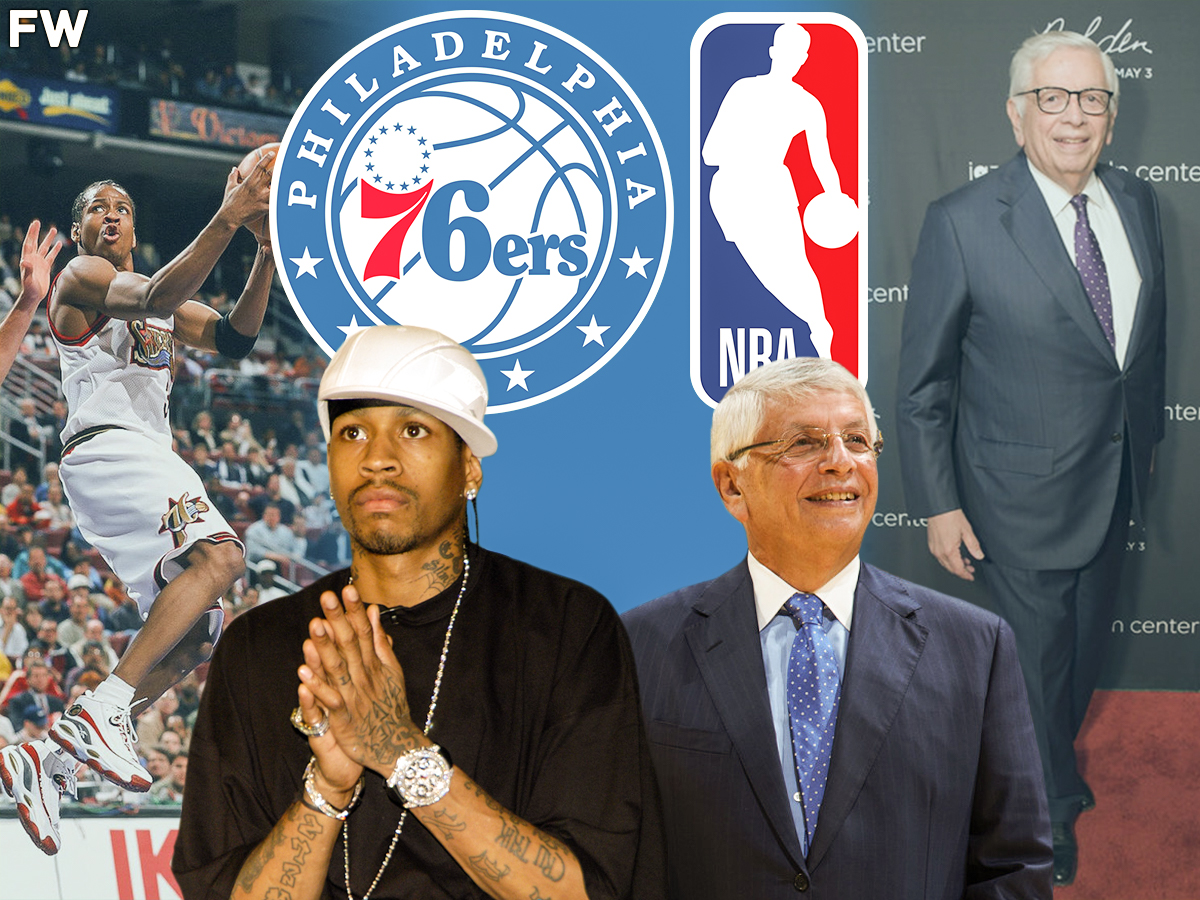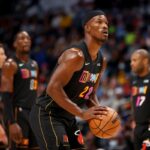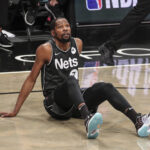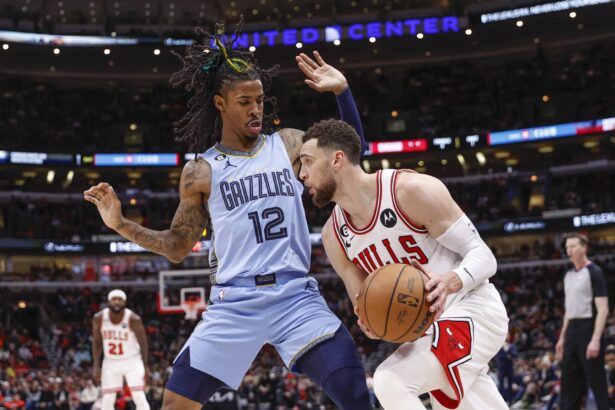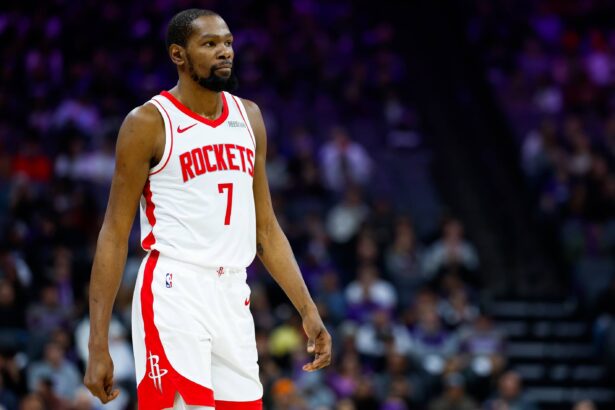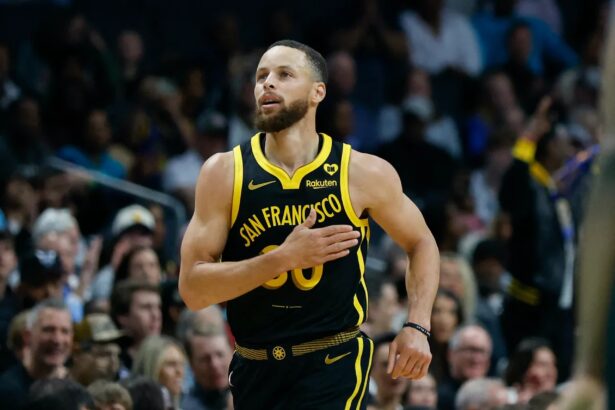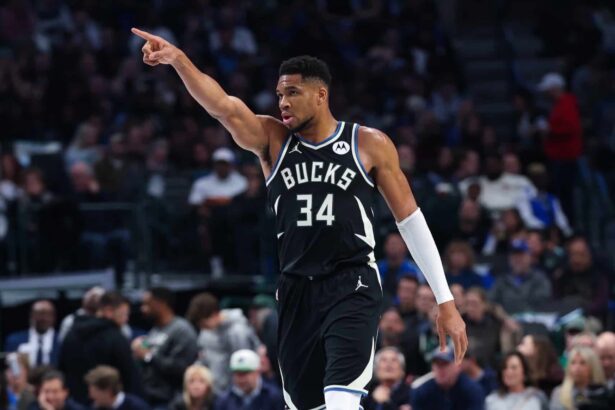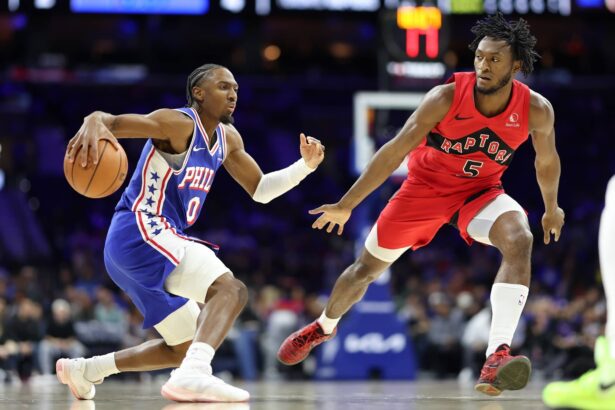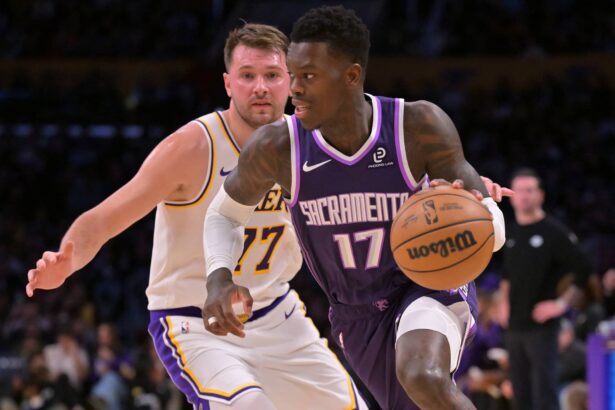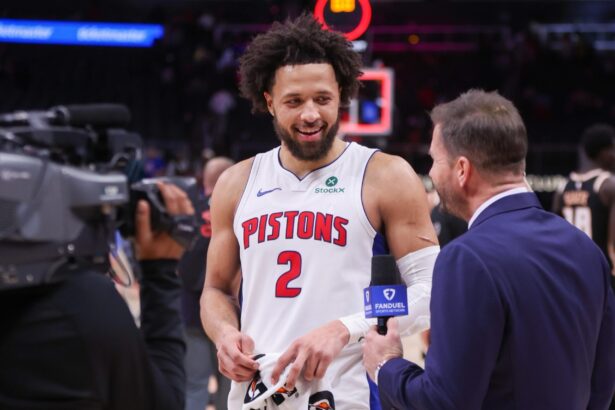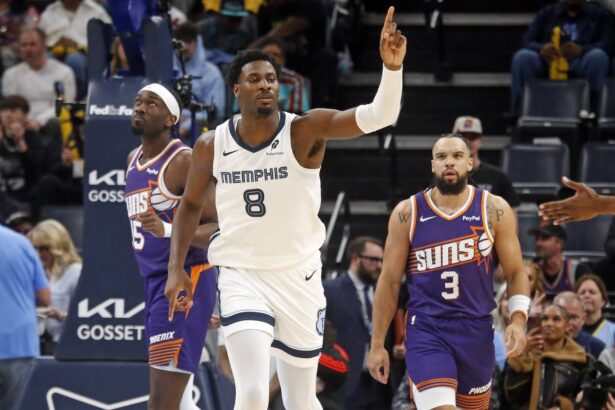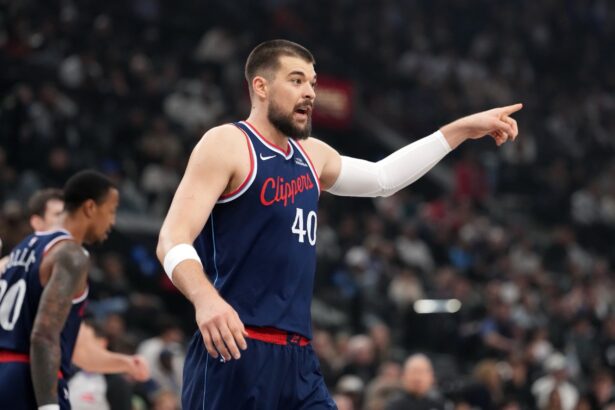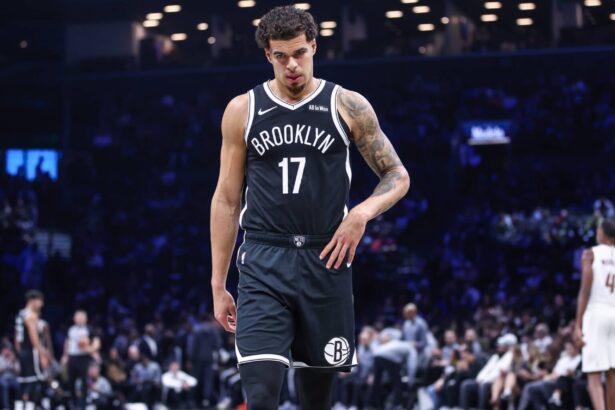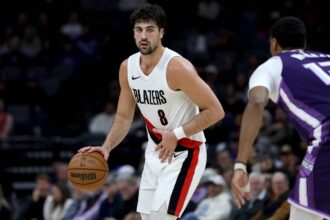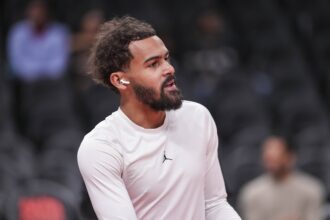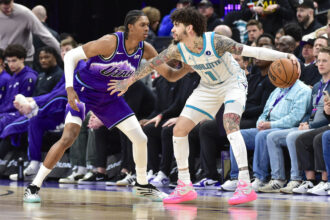In the 1996 NBA Draft, when the Philadelphia 76ers were on the clock for the first pick, they had to decide which star player to dedicate their future to.
- The NBA Dress Code
- The Referees Targeted Iverson
- Olympic Snub
- David Stern’s Media
- The End Of Iverson’s Career
- Next
- The Story Of Michael Jordan’s Statue: “The Best There Ever Was. The Best There Ever Will Be.”
- The Steve Kerr Story: How A Family Tragedy Helped Kerr Bond With Michael Jordan
- Run-TMC: Tim Hardaway, Mitch Richmond, And Chris Mullin Were Showtime In The Early 90s
- Jayson Williams: His Story Of Basketball And Legal Troubles
- Delonte West: From NBA Player To His Fall From Grace
There were many great players in the draft, from the late Kobe Bryant to the current all-time three-point made leader, Ray Allen, to two-time league MVP and current Nets coach Steve Nash.
But none of these players were who the 76ers wanted. They had a different choice and had an answer…
The 76ers would go on to select Georgetown Hoyas’ star guard, Allen Iverson.
There were high hopes for Iverson because of his dominant play when he was at Georgetown. Iverson became the Hoyas’ all-time career-scoring average leader by putting up 22.9 PPG.
Iverson also dominated the ball on the defensive end as well as his quickness helped him jump into the passing lanes with ease.
Iverson ended his college career (two years) as the winner of the Big East Defensive Player of the Year award in both years.
When the 76ers drafted Iverson, they not only got an incredible scorer but a star who could pickpocket the ball with the best of them.
They also got the player who would single-handedly revolutionize the game forever.
By the time the late 1990s were around, Hip-Hop had taken over the music industry and also the fashion industry.
Let’s be honest, the Hip-Hop culture took America by storm, and no player represented this culture more than Allen Iverson.
Iverson sported the “cornrows” hairstyle, making him one of the first NBA players to popularize this hairstyle and is the most famous player for rocking them.
Iverson wasn’t the first, but he did showcase many tattoos, which helped popularize him with the Hip-Hop movement.
A memorable appearance wasn’t Iverson’s only trait that helped him gain popularity in the Hip-Hop community because his style of play was just as important.
From his killer crossover that was just nasty (ask Michael Jordan, he’ll tell you), to his ruthlessness to get up after every hard fall, Iverson really resonated with people.
Moreover, being drafted to Philadelphia, the City of Brotherly Love, the place that boos Santa Claus… the perfect storm was brewing.
The entire basketball community seemed to be on Iverson’s side… well, all but one very important person. NBA commissioner, David Stern.
There was a rumor going around back in the 2000s when Iverson was at the height of his popularity.
The rumor was that David Stern disliked Iverson. This wasn’t just a small “beef” with Iverson, no, Stern hated Iverson’s guts.
Why would the commissioner of the NBA hate his most popular player at the time?
The thing about Iverson was, he wasn’t just the most popular during the early 2000s, his popularity rivaled that of Michael Jordan.
Stern hated the fact Iverson was so popular. He felt that Iverson didn’t represent the league the way he wanted the NBA to be represented.
Iverson, who won the MVP in the 2001 NBA season, didn’t earn the same respect that other MVPs seemed to get in the past.
It was said that Stern wanted to end Iverson’s popularity. This is especially true after Iverson recorded a rap song titled 40 Bars.
Stern immediately forced Iverson to change some of the lyrics, as he felt the song didn’t represent the NBA.
After this, it was apparent that Stern wanted to end Iverson’s career, and that’s what he’d do.
Here are some instances where David Stern and the NBA ruined Iverson’s career.
The NBA Dress Code
On October 17th of 2005, David Stern and the NBA put in a strict dress code for its players.
Some people believe the reason for the dress code was because of the brawl that happened the previous season in Detroit.
This is part of the reason indeed, but it was reported the main reason for the ban, and even for the reason the brawl occurred, was because of Allen Iverson.
Stern believed Iverson was the main reason why the Hip-Hop culture ran rampant in his NBA during the early 2000s.
It was Iverson’s style that the other NBA players were trying to mimic. Even the great coach, Phil Jackson, caught on to this trend, and he didn’t like it:
“The players have been dressing in prison garb the last five or six years… all the stuff that goes on, it’s like gangsta, thuggery stuff,” Jackson said.
Yes, the style inspired by Iverson was rubbing the higher-ups in the league the wrong way.
The clothing items banned were as follows:
– Sleeveless shirts
– Shorts
– T-shirts, jerseys, or sports apparel (unless appropriate for an event, and approved by the team)
– Headgear of any kind while a player is sitting on the bench or in the stands at a game, during media interviews, or during a team or league event
– Chains, pendants, or medallions worn over the player’s clothes
– Sunglasses while indoors
– Headphones (other than on the team bus or plane, or in the team locker room)
The Referees Targeted Iverson
As a star player in the NBA, you usually benefit from getting a few foul calls in your favor.
Iverson was the most popular player in the league in the early 2000s. He was more popular than Kobe Bryant, Shaquille O’Neal, Vince Carter, all of them.
Yet, when it came to getting the benefit of foul calls, Iverson seemed to lack in that department.
NBA referee Tim Donaghy resigned from the NBA on July 9, 2007. The reasoning for his resignation was from the fact the FBI was investigating him.
The FBI alleged that Donaghy bet on games that he officiated during his last two seasons and that he made calls that affected the point spread in those games.
Donaghy would plead guilty to two federal charges on August 15, 2007. He was sentenced to 15 months in federal prison on July 29, 2008.
In 2009, Donaghy released a tell-all book, exposing the league, titled Personal Foul.
Donaghy said how the league conspired against Iverson. Referees would purposely miss calls that Iverson should have received.
In the 2006-07 season, while as a member of the Denver Nuggets, Iverson criticized the referees for the way they were officiating him.
Iverson would be fined $25,000 by the NBA, but according to Donaghy, the referees were not finished with Iverson.
“We felt as a group that he should have been suspended, and because he wasn’t, we felt like we would teach him a lesson,” Donaghy said.
Iverson’s Nuggets played a game that year on January 6th, where Donaghy was part of the officiating crew.
Iverson would be repeatedly called for a discontinued dribble, which is rarely called in the game.
Donaghy said several fouls that Iverson should have been awarded weren’t called on purpose.
He also said a referee supervisor laughed about the treatment of Iverson midway through the game with the crew.
David Stern denied Donaghy’s accusations of the league conspiring against Iverson:
“An independent review revealed that the NBA’s core values of neutrality and accountability were not compromised by anyone other than Mr. Donaghy,” Stern said in a statement.
Olympic Snub
The 2004 Olympics were a disaster for team USA. Ever since NBA players were allowed to play in the Olympics, Team USA hadn’t lost a single game.
Then, in 2004, team USA lost three games in the Olympics. This is the most losses in one Olympics by Team USA.
The 04 Olympic team was filled with plenty of stars, like LeBron James, Dwyane Wade, Carmelo Anthony, and Tim Duncan.
Of course, other than Tim Duncan, the above-mentioned players were all young and only played one year in the NBA.
Then you had Allen Iverson on the team. In the previous NBA season, Iverson averaged 26.4 points, 6.8 assists, and 2.4 steals per game.
Yet, after the USA failed to win gold, it was Iverson who took most of the blame.
When it came time to select the roster for the 2008 Olympics, Iverson was the only player missing from the above names.
The reasoning was given because of Iverson’s performance on that let-down of a 04 Olympic team.
This is odd, though. Because if you look at the numbers, Iverson led the 04 team USA in scoring with 13.8 points per game.
In contrast, LeBron James only averaged 5.4 points per game, yet, he, just like Wade and Anthony, got invited on the team.
David Stern’s Media
After the 04 Olympic disaster, Iverson took most of the blame for Team USA’s performance.
Why is that, though? Why was the media harsher on Iverson than, let’s say, Tim Duncan?
It’s believed that David Stern controlled what the media said about the NBA and its players.
So, Stern apparently only wanted negative stories to emerge about Iverson. As far fetched as this sounds, there are instances that do support this claim.
One perfect example is when Iverson announced his retirement. For another player, ESPN and other news outlets talk about the good stuff a player has done throughout his career.
But when Iverson retired, ESPN put up a poll for their viewers to vote on. The poll was this: What will you remember Allen Iverson for?
Here were the choices the viewers could select from:
A. Hall Of Famer
B. His Practice Rant
One of the greatest guards to ever lace up a pair of shoes and step onto a basketball court had an option for fans to select when he went off on the media?
That’s disrespectful, to begin with, and the whole “practice rant” was also another case of the media speaking negatively about Iverson.
In the rant, Iverson famously said the word, practice, 22 times. People make jokes about the incident, and even reporters who were there believed Iverson to be drunk.
Philadelphia Daily News’ John Smallwood, who was at the press conference, had this to say about it:
“If he had been sober, he would have been able to get himself out of that. He never would’ve gone down that path. Maybe you had to have been around him all the time to know the difference, but we all knew.”
It wasn’t just the reporters who believed Iverson was drunk, even his coach, Larry Brown, reportedly thought Iverson was wasted.
“I assume he went and fooled around somewhere,” Brown said, tipping his hand upward like a bottle.
Everyone remembers the practice rant, they remember the jokes that came from it. What people don’t remember is what Iverson said after he was done talking about practice:
“I’m upset for one reason: ‘Cause I’m in here. I lost. I lost my best friend. I lost him, and I lost this year. Everything is just going downhill for me, as far as just that. You know, as far as my life. And then I’m dealing with this… my best friend is dead. Dead. And we lost. And this is what I have to go through for the rest of the summer until the season is all over again.”
Iverson’s best friend, Rahsaan Langford, was shot and killed seven months before this press conference, and it was truly something Iverson had a tough time getting over.
Days before the press conference happened, the murder trial for the man accused of killing Langford, began. So, it brought back that bad memory for Iverson.
So, as you see, the media depicted Iverson as a troublemaker who didn’t want to practice. When in reality, he was a grieving friend.
The End Of Iverson’s Career
I stated earlier that David Stern wanted to end Allen Iverson’s career, and it looks like he may have.
With the hate that Stern seemed to have for Iverson and the control Stern undoubtedly had over the teams in his league. It appeared Allen Iverson was blackballed from the league.
Iverson, who averaged 26.4 points and 7.1 assists per game in the 2007-08 season, was traded to the Detroit Pistons the following season.
Iverson started the season, scoring 24 or more points in four of the first five games. Then, his minutes would decline in favor of guard Rodney Stuckey.
On April 3, 2009, the Pistons announced that Iverson would not play the remainder of the season.
Pistons President of Basketball Operations, Joe Dumars claimed Iverson’s ongoing back injury was the reason for his deactivation.
Two days before this announcement, Iverson stated publicly that he’d rather retire than be moved to the bench.
Iverson finished the 2008-09 season with an average of 17.5 points and 5.0 assists per game.
September 10, 2009, Iverson signed a one-year contract with the Memphis Grizzlies. He wouldn’t stick around in Memphis for that long, though.
After playing only three games, Iverson and the Grizzlies mutually agreed to end his contract.
Iverson reportedly didn’t want to be a bench player, which was odd, to begin with. He still could play the game at a high level, when given the chance.
In those three games with the Grizzlies, Iverson only played 22.3 minutes per game. He averaged 12.3 points per game.
No team wanted Iverson after his release, and he spoke about retirement. Then, 76ers guard Lou Williams broke his jaw and was expected to miss 30 games.
The 76ers eventually signed Iverson back to a one-year, non-guaranteed contract. Where he played well, but in limited minutes.
On February 22, 2010, Iverson left the 76ers indefinitely to attend to his 4-year-old daughter’s health issues.
The 76ers would eventually announce that Iverson would not return to the team. After the 2009-10 NBA season, the 76ers didn’t want him, and no other team did.
Iverson would play 10 games overseas for a team in the Turkish Super League before officially retiring from a calf injury.
It’s sad to see any player, let alone a former star, who never seemed to get a fair share of the glory he helped to bring the game. Be, in a way, kicked out of the league.
David Stern never officially admitted to hating Allen Iverson or wanting him out of the league.
The only true source is from a disgruntled former referee who got caught cheating on games. So, it’s hard to say what’s real or not.
But when you look at all the evidence throughout the years, it appears David Stern and the NBA ruined Allen Iverson’s career.

